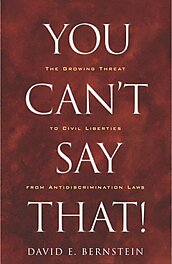“In America, we must carefully censor our speech as rules and laws stifle the most benign utterances. Bernstein illustrates the very real threat to the First Amendment and our civil liberties from increasingly absurd restrictions on free expression.”
—Catherine Crier
Court TV, and author of The Case Against Lawyers
“A must-read for anyone—left, right, elsewhere—who seriously cares about liberty in America.”
—Eugene Volokh
Professor of law, UCLA, and author of The First Amendment: Problems, Cases and Policy Arguments
““This book raises important and troubling issues about the erosion of civil liberties and shows how the guarantees of these liberties in the First Amendment have been repeatedly set aside when they conflict with antidiscrimination laws. Those who treasure civil liberties must read this book.”
—Diane Ravitch, author of The Language Police
“An important warning that the constitutional freedoms Americans hold most dear are threatened by the insidious influence of authoritarian busybodies who want to regulate every aspect of American life in furtherance of a radical, tyrannical egalitarian agenda.”
—Walter Williams, Former Chairman of the Department of Economics, George Mason University, and syndicated columnist
““The tension between antidiscrimination laws and civil liberties, such as free expression, privacy, and personal autonomy, is one of the most important and least explored challenges to individual freedom of our age. In this impassioned book, David Bernstein makes the libertarian case of vigorously defending freedom against the demands of legalized egalitarianism.”
—Jeffrey Rosen, Legal affairs editor,The New Republic, and author of The Unwanted Case
“It’s fashionable in some circles to say that political correctness is a myth, but it’s not—and Bernstein offers proof, along with explanations of the harm that it’s doing.”
—Instapundit, GlennReynolds.com
“This excellent book demonstrates that, in case after case, ‘activists’ for one cause or another have shown a willingness to trample on the rights of others.”
—National Review
“[T]he American judiciary has established a pattern of activism that seeks to elevate antidiscrimination concerns above other legal, political and social concerns. The result of such action, assert[s] Bernstein, is a ‘threat to civil liberties,’ specifically those liberties guaranteed by the First Amendment.”
—Peter Leroe-Munoz, The Record, the Independent Newspaper at Harvard Law School
“Bernstein shows that the use of antidiscrimination laws in ways that interfere with someone else’s civil liberties is not isolated to a single part of the political spectrum. It is not only Democrats who are guilty of the abuse, but Republicans as well.”
—Accuracy in Academia
“You Can’t Say That! does an excellent and methodical job of cataloging the insanity of anti-discrimination run amok.””
–The Washington Times
“If you’re looking to start an argument, take this book to an ACLU meeting.”
—The New York Post
”
